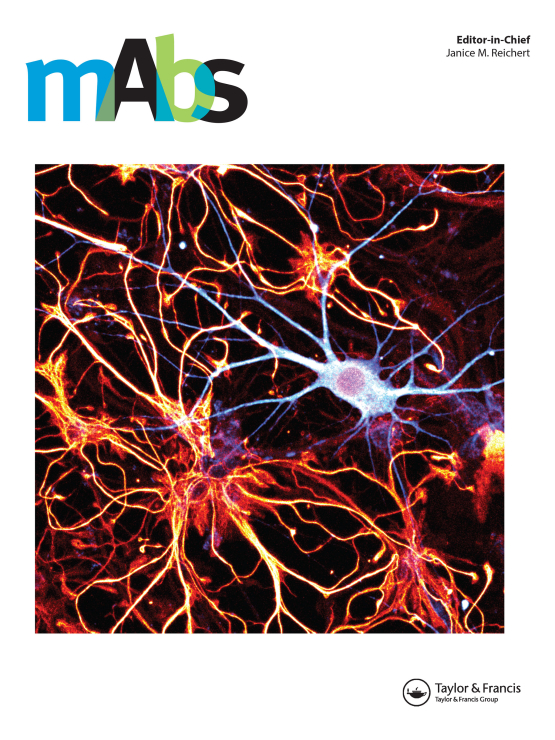Submit a Manuscript to the Journal
mAbs
For an Article Collection on
Artificial Intelligence and Machine Learning in Antibody Development
Manuscript deadline


Article collection guest advisor(s)
Dr. Pin-Kuang Lai,
Stevens Institute of Technology
plai3@stevens.edu
Dr. Konrad Krawczyk,
NaturalAntibody
konrad@naturalantibody.com
Artificial Intelligence and Machine Learning in Antibody Development
mAbs is pleased to invite you to the upcoming Article Collection “Artificial Intelligence and Machine Learning in Antibody Development” led by Dr. Pin-Kuang Lai and Dr. Konrad Krawczyk.
Antibody development has witnessed remarkable advancements in recent years, driven by innovations in biotechnology and bioinformatics. With the growing complexity of therapeutic antibody design, formulation, and optimization, artificial intelligence (AI) and machine learning (ML) have emerged as transformative tools. These technologies offer unprecedented opportunities to analyze vast datasets, predict antibody behaviors, and design effective biologics more efficiently. From the identification of novel targets and epitopes to optimizing antibody stability and manufacturability, AI and ML are reshaping the traditional paradigms of antibody research and development. This article collection seeks to highlight cutting-edge applications of AI and ML in advancing antibody science and address emerging challenges in this dynamic interdisciplinary field.
The integration of AI and ML in antibody development is critical to overcoming some of the most pressing challenges in biotherapeutics. Traditional experimental approaches to antibody discovery and optimization are often time-consuming, resource-intensive, and limited in scope. AI and ML offer scalable solutions that can predict antibody aggregation, stability, and viscosity, accelerating the development of high-concentration formulations and bispecific antibodies. Additionally, these technologies empower researchers to uncover hidden patterns in experimental data, enabling the rapid identification of drug candidates with superior therapeutic potential. Given the increasing demand for biologics in treating chronic and complex diseases, leveraging AI and ML has become essential to meet global healthcare needs efficiently and effectively.
This Article Collection invites contributions that explore AI and ML applications within the scope of antibody research and development. Submissions may cover a range of topics, including but not limited to computational antibody design, epitope and paratope prediction, prediction of biophysical properties such as stability and viscosity, and the use of deep learning for high-throughput antibody screening. Studies on integrating AI/ML with experimental techniques like SAXS, NMR, and molecular dynamics simulations are also welcome. Preferred article types include original research, reviews, and perspectives that address challenges, innovations, and future directions. This Collection aims to provide a platform for interdisciplinary collaboration and to inspire advancements in the application of AI and ML to transform the landscape of antibody development and therapeutics.
Keywords: Machine Learning; Antibody Discovery; Antibody Development; Developability Screening; High-Concentration Formulations
Please review the Submission Instructions below prior to submitting a manuscript.
Article Collection Guest Advisors
Dr. Pin-Kuang Lai is an Assistant Professor in the Department of Chemical Engineering and Materials Science at Stevens Institute of Technology. His work focuses on advancing computational tools, including machine learning and molecular simulations, alongside biophysical characterization methods such as NMR and SAXS, to predict and analyze antibody stability at high concentrations. Dr. Lai has collaborated with leading pharmaceutical companies, including AstraZeneca, Merck, Sanofi, and Takeda, as well as national laboratories such as NIST and Brookhaven to advance this field. In addition, Dr. Lai serves as an Assistant Editor for the mAbs journal.
Dr. Konrad Krawczyk is a graduate of the Oxford Protein Informatics Group (Deane Lab), that are authors of the SABDAB/SABPRED system, widely used in academia and the industry. He is a founder of NaturalAntibody that develops and integrates computational/data/modeling solutions for the therapeutic biologics industry. His interests cover data curation and computational model development across the entire spectrum that can be applied to biologics engineering: next-generation sequencing, structures, patents, literature search, clinical data, docking, paratope/epitope predictions, protein language models and protein design.
Benefits of publishing open access within Taylor & Francis
Global marketing and publicity, ensuring your research reaches the people you want it to.
Article Collections bring together the latest research on hot topics from influential researchers across the globe.
Rigorous peer review for every open access article.
Rapid online publication allowing you to share your work quickly.
Submission Instructions
Manuscript Submissions:
All manuscripts submitted to this Article Collection will undergo desk assessment and a full peer-review. Please review the journal scope and author submission instructions prior to submitting a manuscript as it will be rejected if it does not fall within the scope of the journal.
The deadline for submitting manuscripts is 31st December 2025.
Please submit your manuscript on our website, selecting "Artificial Intelligence and Machine Learning in Antibody Development" from the drop-down menu for consideration in this Article Collection. Please include any discount codes before you submit as these will not be applied retrospectively.
Please contact Ashley Ambros with any queries and discount codes regarding this Article Collection.
All manuscripts submitted to this Article Collection will undergo desk assessment and peer-review as part of our standard editorial process. Guest Advisors for this collection will not be involved in peer-reviewing manuscripts unless they are an existing member of the Editorial Board. Please review the journal Aims and Scope and author submission instructions prior to submitting a manuscript.
